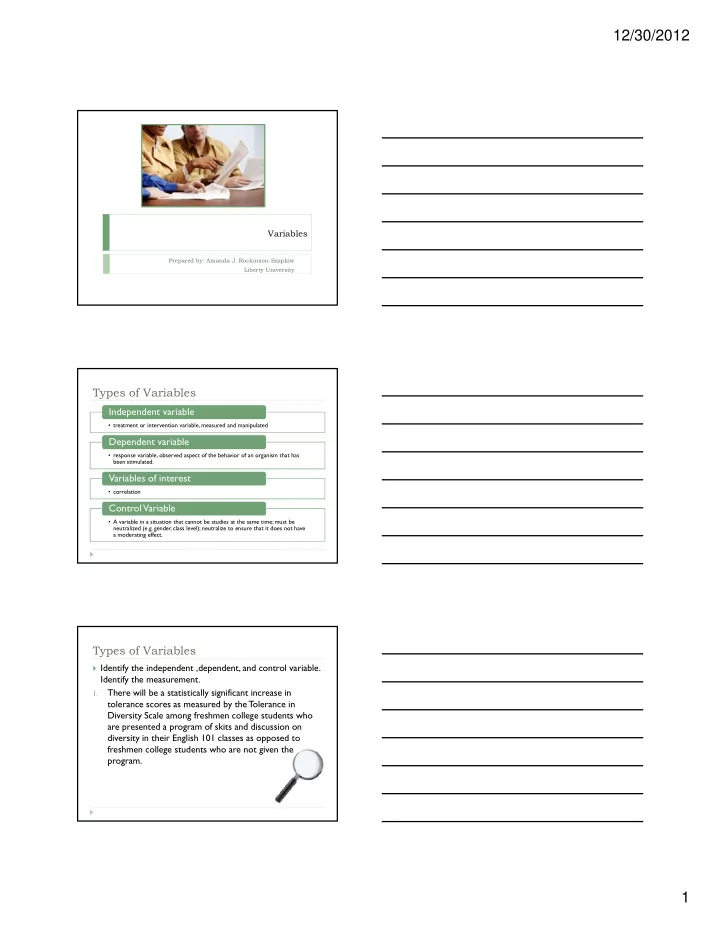

12/30/2012 Variables Prepared by: Amanda J. Rockinson-Szapkiw Liberty University Types of Variables Independent variable • treatment or intervention variable, measured and manipulated Dependent variable • response variable, observed aspect of the behavior of an organism that has been stimulated. Variables of interest • correlation Control Variable • A variable in a situation that cannot be studies at the same time; must be neutralized (e.g. gender, class level); neutralize to ensure that it does not have a moderating effect. Types of Variables Identify the independent ,dependent, and control variable. Identify the measurement. There will be a statistically significant increase in 1. tolerance scores as measured by the Tolerance in Diversity Scale among freshmen college students who are presented a program of skits and discussion on d f k d d diversity in their English 101 classes as opposed to freshmen college students who are not given the program. 1
12/30/2012 Types of Variables There will be a statistically significant difference in 2. graduation rates of at-risk high-school seniors who participate in an intensive study program as opposed to at-risk high-school seniors who do not participate in the intensive study program. Types of Variables Male veterans seen for depressive symptoms at an 3. outpatient clinic of the Veteran’s Administration (V.A.) and prescribed Prozac have statistically significant lower scores on the Beck Depression Scale than male veterans seen for depressive symptoms at an outpatient VA clinic who do not receive Prozac V.A. clinic who do not receive Prozac. Taken from: LaFountain & Bartos Identify and Label the Variable Variable Research Question (and/or Operational Definition (include survey hypothesis) and specific items on the survey where applicable) & Citation Dependent Variable 1: External Is there difference in the second grade students’ attitudes toward math as measured by the Attitudes Toward Mathematics Inventory who participate in the Math 2.0 program as opposed to second grade students who participate in a traditional math class? H 01 : There is no difference in second grade students’ external attitudes toward math as measured by the Attitudes Toward Mathematics Inventory who participate in the Math 2.0 program as opposed to second grade students who participate in a traditional math class. 2
12/30/2012 Define A narrative definition An operational definition- is a clear, concise definition of how a variable is being measured or the observable condition (LaFountian & Bartos, 2002). Identify and Label the Variable Variable Research Question (and/or Operational Definition (include survey hypothesis) and specific items on the survey where applicable) & Citation Dependent Variable 1: Extrinsic Is the difference in the second grade Extrinsic motivation refers to the desire to engage in an activity because Motivation students’ attitudes toward math as it leads to an measured by the Attitudes Toward unrelated outcome (Deci, 1972; Mathematics Inventory who Spaulding, 1992). participate in the Math 2.0 program as opposed to second grade students The Attitudes Toward Mathematics who participate in a traditional math Inventory ((Tapia & Marsh, 2004; external); Questions 3,5,7,11 class? H 01 : There is no difference in second grade students’ external attitudes toward math as measured by the Attitudes Toward Mathematics Inventory who participate in the Math 2.0 program as opposed to second grade students who participate in a traditional math class. Application Label, Define, and Identify Your Variables. 3
Recommend
More recommend